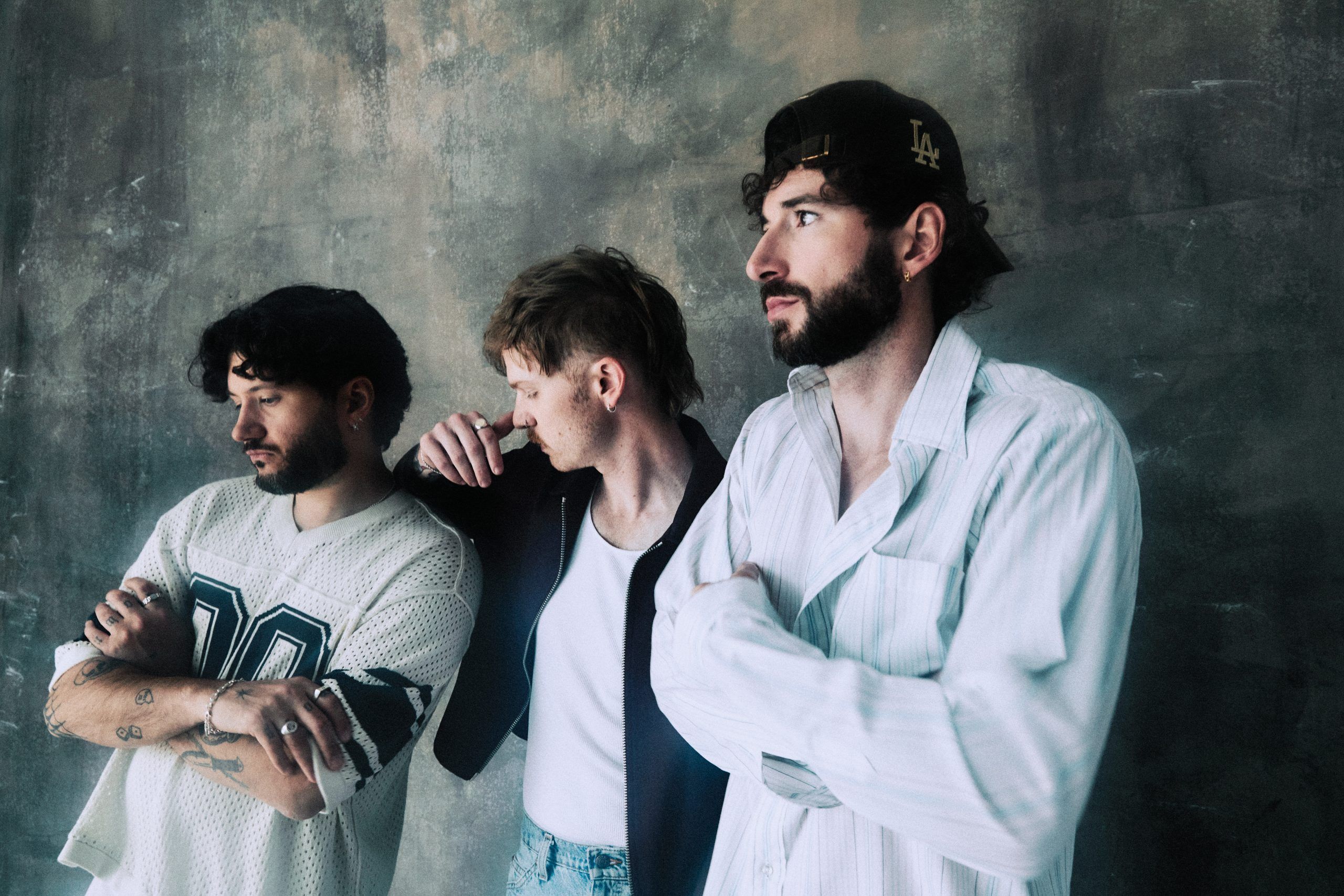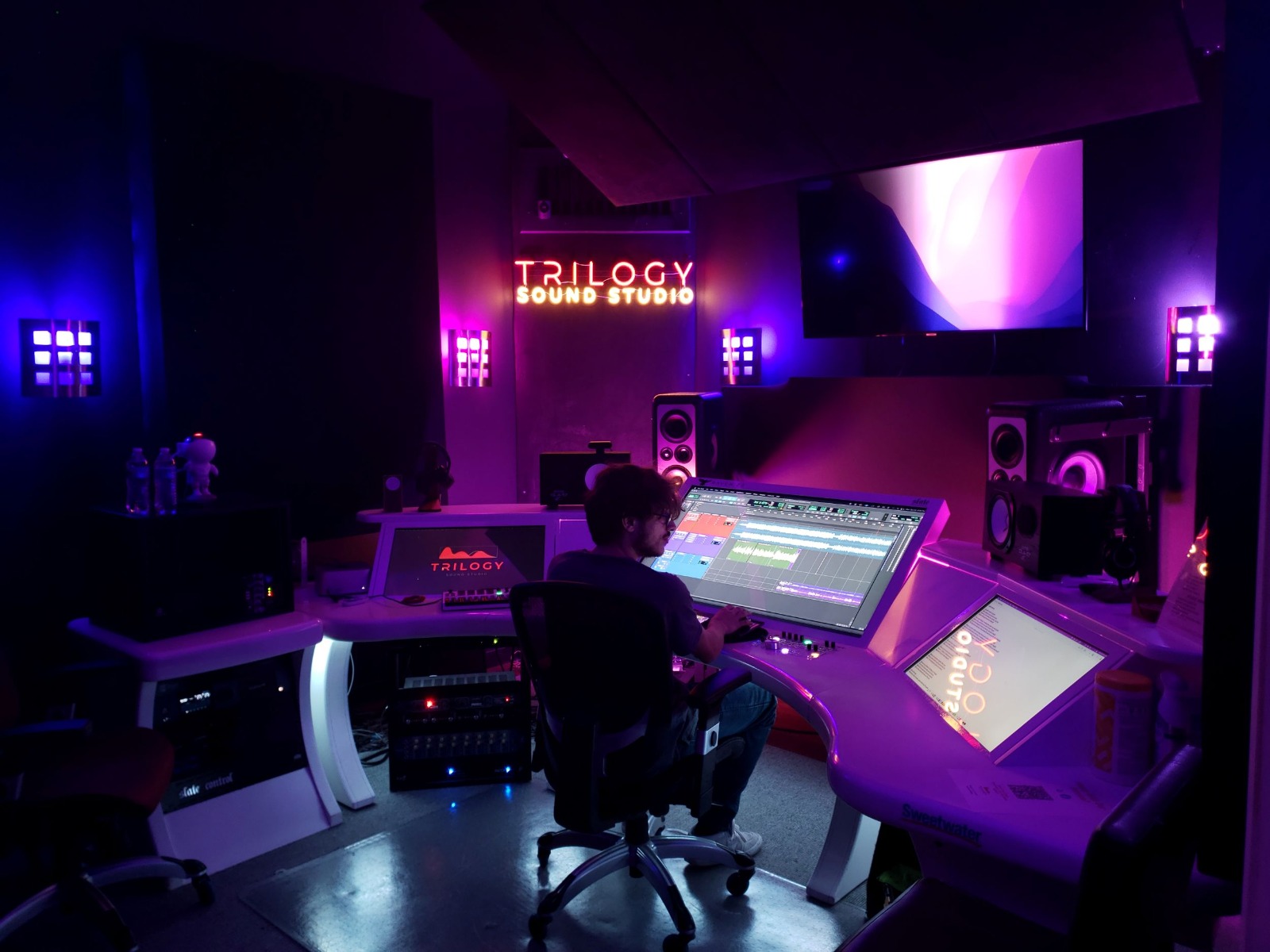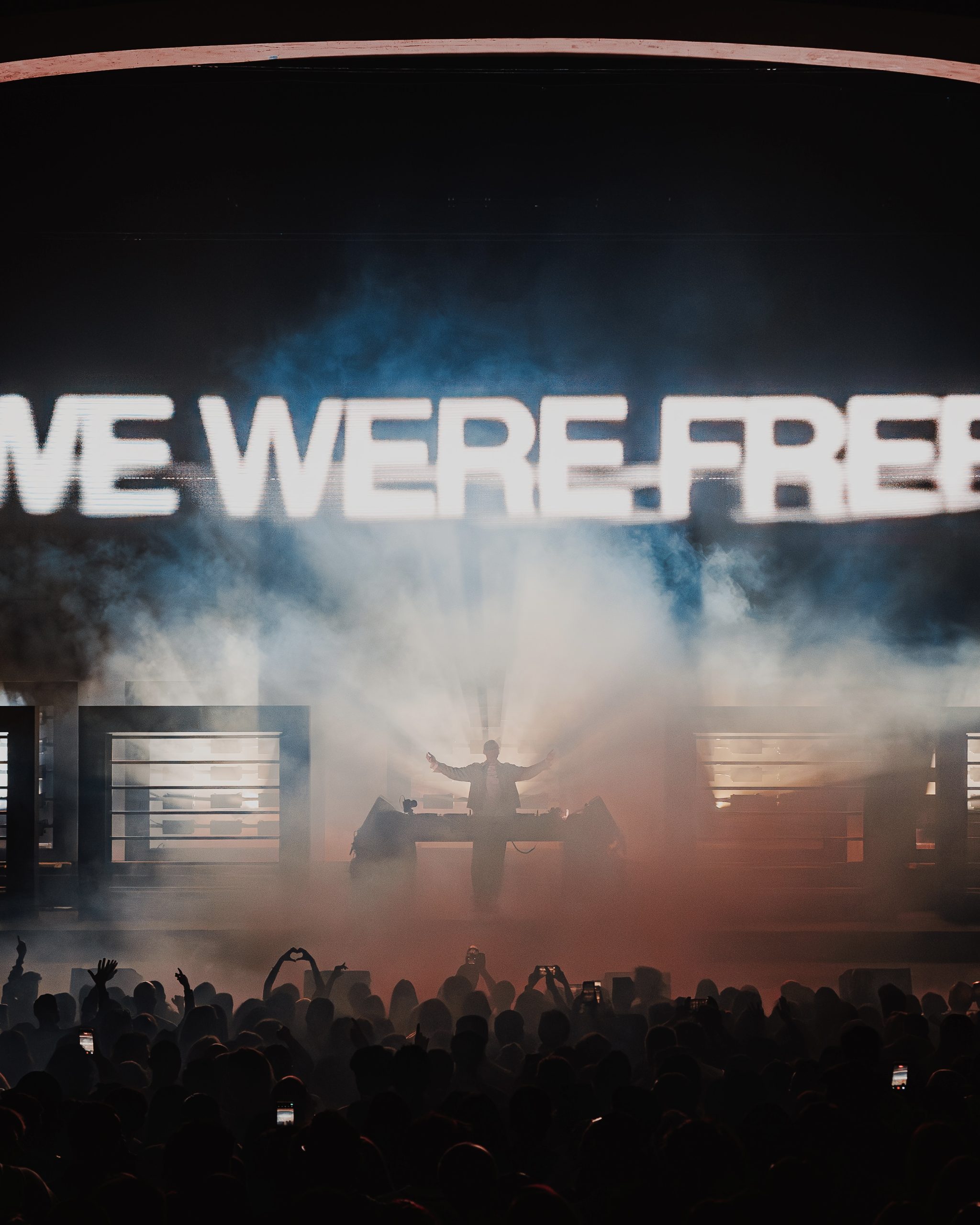On paper, The Band CAMINO shouldn’t be at a crossroads. The Nashville-bred trio, comprised of Jeffrey Jordan, Spencer Stewart, and Garrison Burgess, have racked up nearly a billion streams, sold out headline tours across the globe, and carved a reputation as one of the most emotionally direct and sonically ambitious bands of their generation. But with their forthcoming third album, NeverAlways, which came out at the end of July, the band isn’t just levelling up — they’re learning to live in the liminal spaces where contradiction thrives.
The title itself feels like a manifesto: two absolutes smashed together, daring you to sit with paradox. Across its 11 tracks, NeverAlways is an exploration of duality — joy and despair, intimacy and distance, chaos and control. At once anthemic and vulnerable, the songs feel like dispatches from the edge of clarity, where love is both a salvation and a spiral. It’s an album that the band wouldn’t have been able to make five years ago; a perfect snapshot of who they are and what the band is becoming.
That journey began a decade ago in Memphis dorm rooms and dive bars, evolving through the tryhard EP’s hungry urgency, the glossy confidence of their self-titled debut, and the brooding catharsis of 2023’s The Dark. With NeverAlways, though, The Band CAMINO leans into tension rather than resolving it. The result is their most expansive work yet — a record that asks uncomfortable questions, embraces overthinking as both curse and catalyst, and finds unexpected beauty in uncertainty.
Now entering their tenth year as a band, The Band CAMINO sound less like they’re chasing something and more like they’ve found a rhythm in contradiction. On NeverAlways, they don’t have all the answers. But maybe that’s the point — the music is what happens when you finally admit you’re stuck between “never” and “always,” and decide to sing from there anyway.
In conversation with 1883’s Kelsey Barnes, Jeffrey Jordan, Spencer Stewart, and Garrison Burges of The Band CAMINO open up about the creation of NeverAlways, their forthcoming tour across the globe, and more.
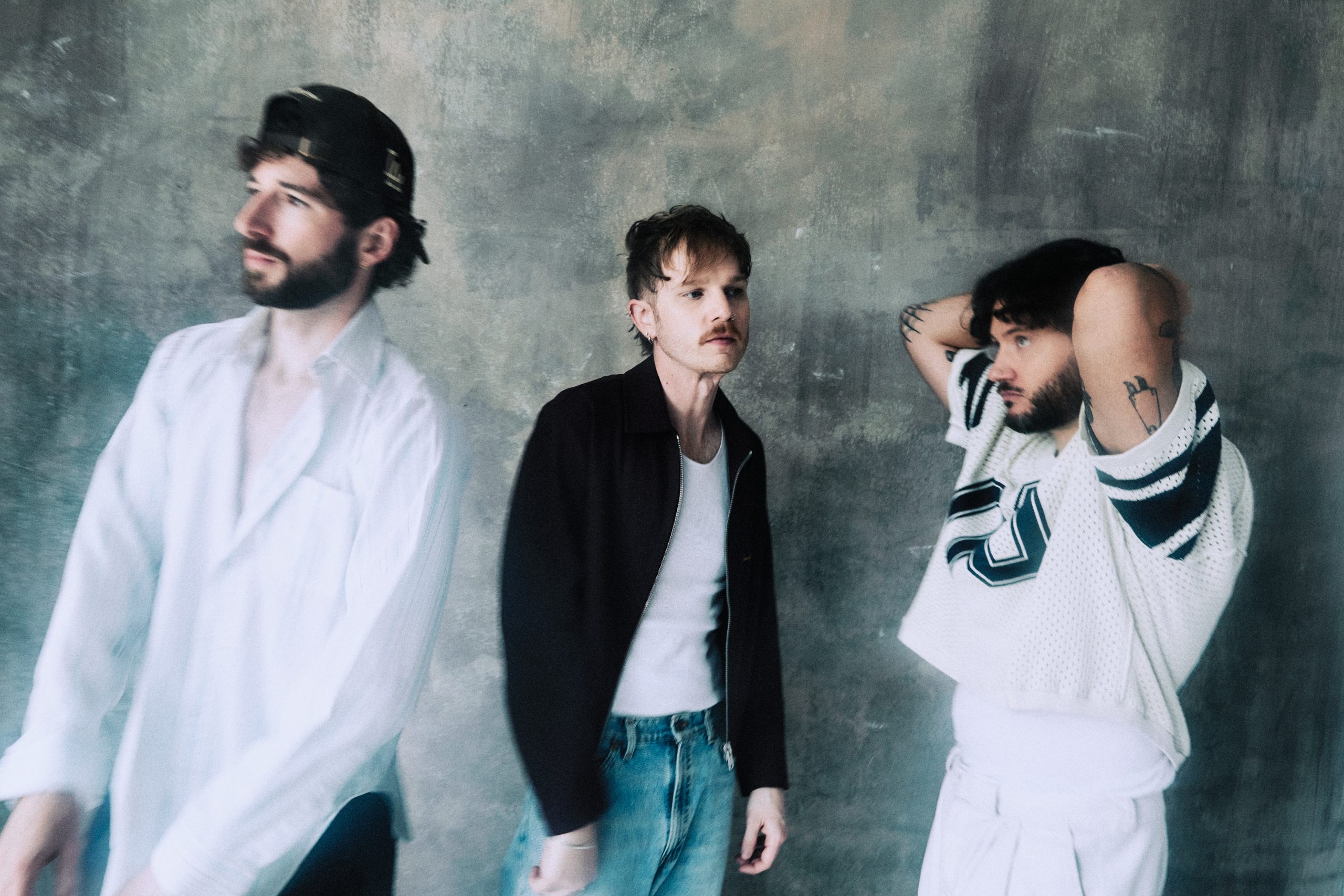
There’s a clear duality in the title NeverAlways — two strong words that are both absolutes. What does that juxtaposition represent in the context of this album?
Jeffrey: Those are definitely extremes — never and always. I think it’s an album about extremes and the extreme feelings we all seem to be feeling collectively as humans and the things we’re going through. Through writing about the extremes, we realized that oftentimes the sweet spot is about balance. Somewhere in the middle is where life happens.
Life happens between these extremes of life and death, of being born and dying, of never existing. We exist, but we aren’t here forever. It’s not never, it’s not always. We’re just here for a second, and everything we do and experience is in that little window between nothing and everything.
It’s a little heady, but it’s an album about life and us finding balance as we continue to grow, get older, experience things, and realize we’re not alone in all this — even though sometimes it feels that way. Everyone’s going through the same shit in their own way.
Spencer: Do you want to give a little personal anecdote about where you heard the quote you were talking about the other day?
Jeffrey: Yeah, so it actually stemmed from this quote I misheard. I was listening to an audiobook, and the way I interpreted it was that this person was saying they like to live their life through the lens of “never” and “always,” because it helps them not be lukewarm about things.
For example, if I’m deciding where to invest my time, I could either play video games or go on a jog. A video game might be something I never want to do or always want to do, while jogging is something I probably always want to try to do. In a way, it’s about choosing things you want to keep doing and keep investing time in, and ditching the “sometimes” category. It’s about not being lukewarm. That’s probably not always a healthy mentality — we learned that through writing. Extremes can be toxic, especially in arguments: “you always do this,” or “you never do this.” Those words can be triggering and unfair, because most of the time, it’s somewhere in between. But the idea that inspired it was me mishearing a quote about not being lukewarm in the things I do.
I love it when things like that happen. It’s serendipitous — you mishear something that ends up being the title of your third album. I think that’s great.
Jeffrey: I even went back and dug through this audiobook, listening to the whole thing again trying to find the quote. I skimmed past the part I thought I heard and realized, “That’s not it.” I finished the whole book and thought I must’ve made it up. Then I went back and listened again and realized, “That is what I heard.” I was just doing something else at the time, my brain misinterpreted it, and I went off on a tangent, assuming that’s what it meant. At the time, I thought, “Oh, that’s really cool, I like that.” But going back months later, I realized it was completely made up. I didn’t even actually hear it.
An album campaign can get a bit ritualistic — writing, recording, releasing, touring, and repeat. Was there anything different that you guys experienced that made you want to approach NeverAlways differently from your last two?
Jeffrey: Definitely. Our process was different on this album. We’ve always worked with the same producer, Jordan, and we still worked with him for a good amount of the album. But we also self-produced a lot of songs. Garrison produced some tracks and co-produced some with Jordan. We also worked with a producer out in L.A. named Jonah Shy. So we got out of the box. We’d been in that ritual you mentioned — writing, recording, repeating — and we wanted to shake things up. We also wanted to get back to writing for ourselves, remembering how we started as a band: just making things we liked and thought were sick.
As you grow and gain fans, you start hearing more voices — from fans, other writers, labels, and your team. Everyone has opinions, eand veryone’s taste is subjective. You’ll hear, “I love this song,” or “this is my favourite,” but they’re all different. It gets hard to define: what is The Band CAMINO? It’s something different to everyone.
So we wanted to just get back in the room and ask, “What do we like? What are we listening to right now? What’s the vibe?” We wanted the process to feel experimental, fun, and without pressure. Not, “these are our biggest songs, we need to recreate that.” Because when we made those songs, we weren’t copying anything — we were just making something we liked. And that’s the energy we wanted to channel again.
Garrison: We just really want to keep making stuff we like.
Jeffrey: Yeah, and Garrison handled the production on a bunch of it.
How was that?
Garrison: I only had a production credit on “Never A Good Time, I think — that was the first one I co-produced on a Band CAMINO track. But I’ve been producing music for probably five or six years now, working with a lot of different artists. For this record, it just happened naturally. We wanted to do a bunch of songs, some on our own, some with other people, and some by taking what we had and building on it elsewhere. It’s always fun making music, and I love the genesis of an idea and taking it to the finish line — especially that we got to do it as the three of us.
With some songs, it was like, “Let’s get other ideas in the room.” With others, it was, “This is it, that’s all it needs to be.” Don’t overcomplicate it. That’s what guided our choice to self-produce so much of it — the songs already spoke for themselves. We didn’t need to touch them further. It’s been fun.
Touching on that growth of knowing when a song is complete — it’s been 10 years since the band started. How have you grown individually as artists and songwriters, and also together as a unit in that time? When you reflect on a decade of making and releasing music, touring, and everything else, how would you describe your growth as musicians?
Jeffrey: Oh, man. It feels like a lifetime of growth and change. Looking back at who we were when we started the band 10 years ago is funny and crazy. We didn’t know anything, but we were so confident, and we had songs we believed in. It’s hard to put into words, but a lot of life has happened.
Garrison: Yeah. Ten years is a long time. I’ve been in the band for seven, but I’ve been in Nashville for 10 and met them as soon as they moved here. From my perspective, we went from being young guys hopping in a van to now bus touring, being in relationships, getting married, and owning homes. Back then, we were renting with five other guys in a house.
There’s been personal growth, and then growth through the music. It’s always been a constant process of asking, “What are we trying to say? What are we trying to do?” Which ties back to this album — it’s really about life cycles and living them. We all have experiences and stories that change us, and we keep growing into different people. It’s hard to put into words, but we just keep going, and we just keep getting older.
Jeffrey: Yeah. It’s hard to sum up 10 years of change. But I do think there’s been a kind of return on this album — coming full circle on the why. Getting back to just us making music in a room. It feels like over the last year or tw,o we’ve grown, even compared to the last record. We feel more adult, but at the same time, we’ve tapped back into that childlike place of making music — almost like starting over. That comes from going full circle: from having more people in the room, more voices, more popularity, and navigating what success means.
You want success for so long, and then you get it and ask, Okay, now what? We’ve hit so many milestones, but we’re not where we ultimately want to be. The dream is to play in arenas around the world. We look at bands like Coldplay, The Killers, The 1975 — we’re always working toward that next step. It’s a mix of grinding toward what’s next, while also looking around and being grateful for what we have and the journey we’ve been on. It’s about appreciating the process more than chasing milestones.

One of my questions was actually about chasing that childlike innocence — making music for the fun of it, rather than chasing a single that needs to have X, Y, and Z. I can definitely hear that on this album. It sounds like you guys feel very free on this record.
Jeffrey: Oh, I love that. Yeah, definitely. You mentioned “Pieces” being one of your favourites — that was one of the first songs we wrote. It was just the three of us in a room. We made the demo that day, then a couple of months later, went back and re-tracked some vocals, some guitars, and added a few things. That’s what the song is. It really captured that day-of vibe. We tracked some drums on top, and that was it. It wasn’t one of those songs where anyone said, “This is the hit,” but we loved it. We made it, it felt sick, it felt like us. It had good energy, and we produced and wrote it ourselves. Putting it out felt freeing in that way.
Talking about “Pieces” — the lyric, “I’ll keep myself in pieces / If I get it together, I won’t like what I see,” hits incredibly hard. It feels like one of your most confessional and vulnerable tracks. The idea of putting yourself back together and then maybe not liking what you see — that feels heavy. Can you talk about the writing and inspiration behind that line?
Jeffrey: Yeah. It’s about that feeling we’ve all had — using the excuse of not getting it together, because then you don’t have to look at the full picture. Like not looking in the mirror, because if you don’t try, you don’t have to admit you’re failing. That’s where it comes from for all of us.
“Has Just Begun” is a very cinematic way to open the album — it sounds kind of like the opening to a film in a way. What was it about that song that made you want to begin the album with it?
Garrison: Yeah. I mean, quite honestly, Jeff, what you posted on your Instagram like two or three years ago — just a quick snippet of him on a keyboard — it’s always felt powerful. It’s always felt like something that could open a record. I don’t think we’ve ever done an opening track that sets the theme for what we’re talking about and what we’re doing. This one kind of encapsulated all of that. We definitely leaned into a cinematic, “story is about to begin” vibe with it. It just felt right. I don’t really have a deeper answer than that.
Jeffrey: It’s a shorter song, like you said, and when we went into the studio, I initially thought we should write a second verse or expand it. But Spencer was like, “I feel like it just needs to be exactly what it was when you wrote it.” I was kind of like, okay, and so we left it like that.
Garrison: Yeah, and I feel like that’s a common thread with a lot of these songs. There are a few that showcase what we’ve done in the past, what we intended to do, and even what we accidentally moved away from. This is a perfect example of a song we might not have put out on any other record, or we might have tried to turn it into something it’s not. Same thing with “Pieces” — a lot of authentic, unexpected music that comes from a place only the original creator could make. In this case, that’s Jeff. Sometimes you have to step back and just let the song be what it is and let others decide if they like it.
Obviously, live performance is very, very integral. The gig at the Electric Ballroom in Camden in 2020 is probably one of my favourites of all time — it was probably the sweatiest gig I’ve ever been to. That room was intense.
Jeffrey: Oh my God, yes. So we got home from that tour, and that was it. I think we got home around February 28, and that was literally our last show — our last headline show — for like two years. We didn’t want to end there, but, you know, we did.
So, thinking about the production behind these songs, how did your live act influence the recording of them, if at all?
Garrison: I mean, we’ve always approached making a record thinking about how it will translate live. Most of the time, we’re like, “Okay, will this work in a set?” Even if it doesn’t, it still might make the cut — you never know. The elements on this record, going into the upcoming tour, allow us to have what we call peaks and valleys. You want moments where people can chill, breathe, and experience something, not just a nonstop, balls-to-the-wall set for an hour and a half.
There will still be times we rip into a guitar, but this album gives our next show more of a through line or storyline. As we’ve built it, the tracks have been delivered, and the show’s being built as we speak, which is exciting. It’s kind of cool to see everything come to life and tell a story through a live performance. We’re excited to go and do it in a couple of months.
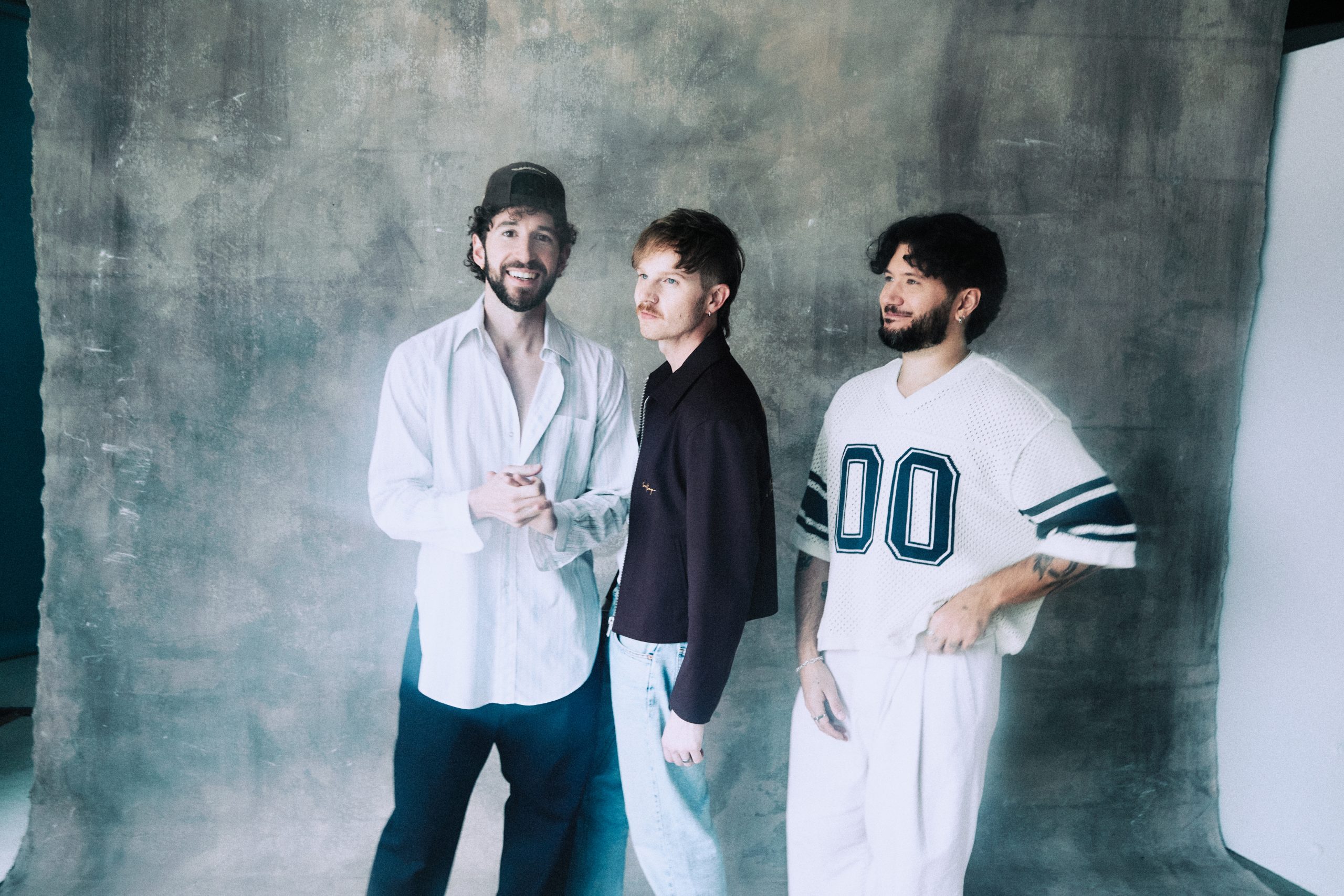
If you guys had to pick a lyric that encapsulates the album’s soul or ethos, what do you think that lyric would be?
Garrison: Oh… There’s a lot.
Jeffrey: I mean, Infinity is kind of that first song we put out. It was definitely, in a way, like you were talking about the live show just now. That was one of the first singles because there are certain songs we’re just like, “We’re definitely putting this out because we want to play it live,” you know? So that was one of those.
When we were deciding songs for the album, we were like, “Oh, this one’s going to be really fun to play live. We’re absolutely putting this out.” But it was also kind of a world-building song, with a lot of language, texture, and trippiness — thinking about introspective, existential things. So that one helped shape the album’s world a little bit.
Spencer: And as the album came together, we were able to finish writing certain songs with this theme of never always in mind. There’s honestly a lot of little nods to that theme throughout the album, which is cool. It’s not a full concept album, but there is a theme.
A lot of times, we’d read songs we felt attached to and proud of, but there wasn’t one cohesive theme. So now, we were kind of figuring out how to box it up and present it — what story we wanted to tell after writing all the songs. Finding that along the way definitely helped shape the remaining songs and the through line.
Visuals are integral to your work. I’ve loved the music videos that you’ve released for NeverAlways so far. “Stupid Questions” and “Hates Me Yet” being filmed in the same house — I loved how Jeremy takes off the sweatshirt like he just came from playing “Stupid Questions” in the other room. Are visuals something you’re thinking about when you’re writing and recording or do you figure that out after?
Jeffrey: Probably both. When we’re thinking about visuals, we’re definitely more music-forward. None of us are really visual people — obviously, musicians often come up with visuals after the music. But there are definitely moments when you’re making something and you see a visual idea for it. You’re like, “Oh, this would be cool,” or “I’m just seeing this.” So it’s probably a little bit of both.
Garrison: Yeah, I would say both as well. For me, it usually comes closer to the back end, after there’s a picture of what the album is. Talking through options and ideas, and kind of what it makes us feel, definitely helps lead the creative charge. But music videos aren’t something I naturally think about very often. We have some help on the creative side — like, here’s the tone we’re feeling, what’s a cool idea — and then we start storyboarding, throwing out ideas, seeing what sticks, what feels like a true through line for what we’re trying to say, and what feels interesting and grabby. It’s really a culmination of all of that that gets us to videos like “Stupid Questions” or “Infinity.”
When you guys release a body of work like this, do you view it as a chapter closing or a chapter opening?
Jeffrey: It’s a difficult answer — right now, it’s both. Somewhere along the album, it’s like two sides of the same door. It’s opening, it’s closing. For us, it was part of making it and also kind of being ready to get out of that chapter of being cooped up in a room together. We’re ready to go on tour. So it’s like closing that door and opening the door for everyone else — to see how the world and our fan base respond, and to take it on the road.
But I’d say more of a beginning because this is where the songs are really born. Sometimes, you don’t even realize how long ago a song was made until you start building the set list. Like, we haven’t listened to Daphne Blue since the last tour, and suddenly we’re like, “Oh my God, we still made this!” It feels like it was so long ago, but it’s ours forever. These new songs are at the beginning of their journey, and we’ll see what happens with them.
Lastly, if someone 10 years from now discovers this album for the first time, what do you want them to take away from it? What should they think about this era of The Band CAMINO?
Jeffrey: I’d hope they think, “This was their biggest album of all time, and it got billions of streams. Wow, good for them.”
Garrison: Yeah. These guys really did something. I hope people think of it as our most authentic work up to this point. Hopefully, this continues, and this is just the beginning of us having the voice we always intended for the band.
NeverAlways is out now. Tickets for The Band CAMINO’s NeverAlways tour are on sale now at thebandcamino.com.
Interview Kelsey Barnes
Photography Jimmy Fontaine
NORTH AMERICA
Oct 10, 2025 – Atlanta, GA – Coca-Cola Roxy
Oct 11, 2025 – Columbia, SC – Township Auditorium
Oct 13, 2025 – Orlando, FL – House of Blues Orlando
Oct 14, 2025 – St. Petersburg, FL – Jannus Live
Oct 16, 2025 – Birmingham, AL – Avondale Brewing Company
Oct 18, 2025 – Austin, TX – ACL Live at The Moody Theatre
Oct 19, 2025 – Dallas, TX – South Side Ballroom
Oct 21, 2025 – Tempe, AZ – Marquee Theatre
Oct 23, 2025 – Hollywood, CA – Hollywood Palladium
Oct 26, 2025 – Salt Lake City, UT – Rockwell at The Complex
Oct 28, 2025 – Denver, CO – Fillmore Auditorium
Oct 30, 2025 – Kansas City, MO – The Midland Theatre
Nov 1, 2025 – Minneapolis, MN – The Fillmore Minneapolis – SOLD OUT
Nov 2, 2025 – Madison, WI – The Sylvee
Nov 4, 2025 – St. Louis, MO – The Pageant
Nov 5, 2025 – Indianapolis, IN – Egyptian Room at Old National Centre
Nov 7, 2025 – Pittsburgh, PA – Stage AE
Nov 8, 2025 – Grand Rapids, MI – GLC Live at 20 Monroe
Nov 9, 2025 – Toronto, ON – HISTORY
Nov 11, 2025 – Brooklyn, NY – Brooklyn Paramount
Nov 13, 2025 – Washington, DC – The Anthem
Nov 15, 2025 – Boston, MA – The MGM Music Hall at Fenway
Nov 16, 2025 – Philadelphia, PA – The Fillmore Philadelphia
Nov 18, 2025 – Louisville, KY – Old Forester’s Paristown Hall
Nov 20, 2025 – Chicago, IL – The Salt Shed
Nov 21, 2025 – Columbus, OH – KEMBA Live!
Nov 22, 2025 – Nashville, TN – The Pinnacle – SOLD OUT
UK + EU
Dec 9, 2025 – Glasgow, United Kingdom – The Garage
Dec 10, 2025 – Manchester, United Kingdom – New Century Hall
Dec 12, 2025 – London, United Kingdom – O2 Forum Kentish Town
Dec 14, 2025 – Haarlem, Netherlands – Patronaat
Dec 16, 2025 – Cologne, Germany – Kantine
Dec 17, 2025 – Berlin, Germany – Columbia Theater
NZ + AU
Feb 19, 2026 – Auckland, New Zealand – The Powerstation
Feb 21, 2026 – Sydney, Australia – Enmore Theatre
Feb 22, 2026 – Melbourne, Australia – Forum
Feb 24, 2026 – Brisbane, Australia – The Tivoli
Feb 26, 2026 – Fremantle, Australia – Freo Social

